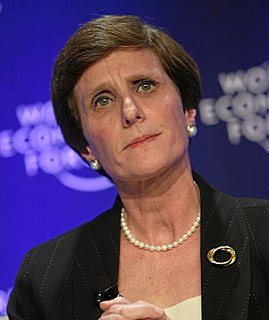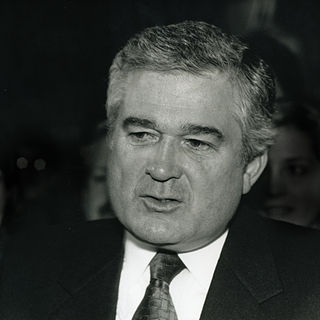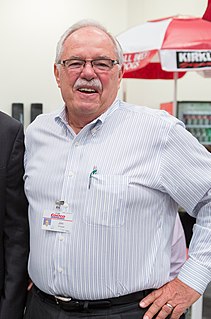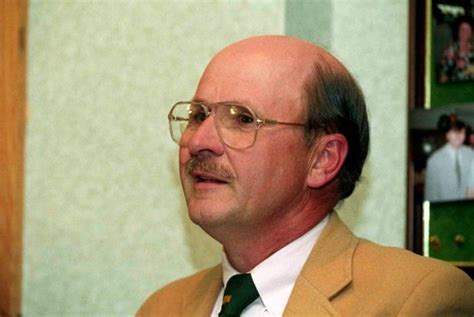Top 278 Shareholders Quotes & Sayings - Page 5
Explore popular Shareholders quotes.
Last updated on April 19, 2025.
Evidently stockholders have forgotten more than to look at balance sheets. They have forgotten also that they are owners of a business and not merely owners of a quotation on the stock ticker. It is time, and high time, that the millions of American shareholders turned their eyes from the daily market reports long enough to give some attention to the enterprises themselves of which they are the proprietors, and which exist for their benefit and at their pleasure.
I'm a spreadsheet guy. But you get to that moment of truth, and it has nothing to do with a spreadsheet. You've got to factor in what your competitors are doing, what the technology is doing, what your shareholders want, what your employees want, what your customers want, and you've got to make it happen sometimes.
I have got this letter which actually goes out the day after I die. It has already been written. And it says that: "Yesterday I died". And then it says: "That's bad news for me, but it's not bad news for you, the shareholders of Berkshire". And then I go on and explain what is going to happen. I know that is one time when they will be really interested in hearing from me.
Our proposal had more than just money. We would increase their staff and keep their headquarters, their brand and their management in place. We made them a comprehensive offer they couldn't refuse. Shareholders simply receive cash, but with the staff and management, we had to show that we could share the same vision. Employees would probably resent us if money were all [we offered].
If the big banks expect to buy influence when they give money to favored think tanks, then the public has a right to know. If the big banks don't expect to buy influence and are merely making charitable contributions, then their shareholders have a right to know. Either way, there's no excuse for keeping these payments secret.
I am very pleased with the progress of the new CBS Corporation. The Company's rapid pace of change and innovative approach to emerging business opportunities can be seen in the many strategic announcements we have made over these past few months. The more focused and more nimble organization we sought to create has become a reality and that aggressive spirit of excellence and innovation will continue to benefit shareholders for many years to come.
To build and sustain brands people love and trust, one must focus-not only on today but also on tomorrow. It's not easy...but balancing the short and long term is key to delivering sustainable, profitable growth-growth that is good for our shareholders but also good for our consumers, our employees, our business partners, the communities where we live and work, and the planet we inhabit
I think there's a lot we could do that maybe would give a little more decision space to CEOs, to shareholders who want to hold for the long term, to investors who want to be part of the long term, that they would maybe have a little more room to withstand the pressure that is otherwise coming down on them.
I agree with Peter Drucker that the culture and legal systems of the United Statesare especially favorable to shareholder interests, compared to other interests and compared to most other countries. Indeed, there are many other countries where any good going to public shareholders has a very low priority and almost every other constituency stands higher in line.
There are two reasons [ business people are not publicly anti-Donald Trump ], one is well-intentioned, which is the classic kind of American notion. We want to be inclusive, we want to have our shareholders, our employees, our customers, whether they are Democrat, Republican, Green or Libertarian, to feel comfortable with how we're doing business. And so that tends to be apolitical. People say, "No, no, I just simply shouldn't get involved in politics."
This is an amazingly sound place. We are more disaster-resistant than most other places. We haven't pushed it as hard as other people would have pushed it. I don't want to go back to Go. I've been to Go. A lot of our shareholders have a majority of their net worth in Berkshire, and they don't want to go back to Go either.
When Wal-Mart brings water down to the Katrina victims, it's not doing that to be nice; it's doing it to make larger profits and to increase the value of its shares. If its actions are not accomplishing those objectives, the shareholders can sue the executives, and sue them successfully, because it is illegal for them to act on behalf of any other reason than increasing the value of their shares. There is nothing wrong with that. That is the way that they were created and the way we want them to function to increase prosperity in the market.
Fannie Mae is owned by shareholders but operates under a federal charter that exempts it from paying state or local taxes. As a result, many professional investors think the government would repay the debt that Fannie Mae had issued if the company could not, although Fannie Mae explicitly says that its bonds do not carry a federal guarantee.
The problems are our lives. In the "developed" countries, at least, the large problems occur because all of us are living either partly wrong or almost entirely wrong. It was not just the greed of corporate shareholders and the hubris of corporate executives that put the fate of Prince William Sound into one ship; it was also our demand that energy be cheap and plentiful.
Driving stock up from one day to the next is not what we are about. We are about building a good company and performing for the long term. I know everyone says that, that sounds trite when I repeat it that way, but that is and has always been our attitude about our business. If we do the right things, the stock price will take care of itself, and our shareholders will be rewarded.
The U.S. has the largest prison population in the world: two million people. One out of every eight prisoners in the world is an African American. We are warehousing people as a profit to shareholders or for benefits to communities that get to host federal prisons. It is modern slavery. The whole future of America's black community is at risk. One out of every three young black men in Washington, D.C., is under one arm or the other of the criminal justice system. These are the continuing consequences of slavery.
Shareholder value is the result of you doing a great job, watching your share price go up, your shareholders win, and dividends increasing. What happens when you have increasing shareholder value? You're delivering better employees to their communities and they can give back. Communities are winning because employees are involved in mentoring and all these other things. Customers are winning because you're providing them new products.
As I have indicated some time ago, I intend to divest my shareholding when I leave the Club. In doing so, my overriding principle is that I shall do what I believe is best for the future of Celtic. I have also indicated my intention that my shareholding will be made available to be held broadly amongst the supporters and existing shareholders of the Club. I believe that this should produce the best structure of ownership for the Club and the Company.
The problems that exist on Wall Street today go to the center of a debate in this country about wealth and democracy. We cannot keep our democracy if those who are in charge of handling the engines of our economy are not honest with their shareholders. That's why there is a role for government regulation here. That role for government is breaking up the monopolies, insisting on public disclosure, insisting on public audits, insisting on restitution whenever someone has been cheated.
Our approach has worked for us. Look at the fun we, our managers, and our shareholders are having. More people should copy us. It's not difficult, but it looks difficult because it's unconventional - it isn't the way things are normally done. We have low overhead, don't have quarterly goals and budgets or a standard personnel system, and our investing is much more concentrated than average. It's simple and common sense.
After a long investigation the SEC has fined Halliburton $7.5 million for issuing fraudulent statements exaggerating their profits in 1998 and 1999 during which their CEO was - oh who was it? Oh that's right. ... Cheney himself has not been implicated in the scandal and according to Cheney's lawyer there is no allegation whatsoever that he acted in any way other than in the best interests of the company and its shareholders. And you know what? It's still true today.
We've now become conscious of the uncalculated social, economic, and environmental costs of that kind of "unconscious" capitalism. And many are beginning to practice a form of "conscious capitalism," which involves integrity and higher standards, and in which companies are responsible not just to shareholders, but also to employees, consumers, suppliers, and communities. Some call it "stakeholder capitalism."
The faster we grew, the more stores we had open, the more money we made. Employees move quickly up the ranks of a company that's growing fast. Shareholders made a lot of money. If you invested $25,000 from January 1987 to January 1994, you'd have more than a million dollars. I get a lot of personal satisfaction from that.
I hope people understand that when you tax corporations that the concrete and the steel and the plastic don't pay. People pay. And so when you tax corporations, either the employees are going to pay or the shareholders are going to pay or the customers are going to pay. And so corporations are people.
The fund scandals shined the spotlight on the fact that mutual fund managers were putting their interests ahead of the fund shareholders who trusted them, which had much more substantial consequences in the form of excessive fees and the promotion - as the market moved into the stratosphere - of technology funds and new economy funds which were soon to collapse.
We believe that there is no greater power in the world than the force of a great idea. We believe that people are the lifeblood of every organization. We believe that the best companies are true meritocracies, where people rise and fall through their own contributions, not through game playing or politics. We believe that work isn't simply a paycheck; it is the ultimate expression of a fully realized self. We believe that a company's obligations extend far beyond its bottom line and its shareholders - to a wider constituency that includes employees, customers, suppliers, and the community.
I've already written a section in the annual report for next year explaining why I think in one case that the figures on our balance sheet as calculated are wrong. But it's the standard way of doing it. It's holy writ. The SEC wants us to do it that way, and we'll do it that way, and I'll explain why I think it's wrong and shareholders can read it and see whether they agree with my logic or don't.
We met financial expectations for the quarter in a difficult economic environment. We also signed a two-year programming agreement with Home & Garden Television to launch two new cable television series, and launched the Martha Stewart Kids magazine These initiatives provide future revenue and earnings growth for the brand and build long-term value for shareholders.
What we're going to do is redouble our efforts on financial regulatory reform, because that has in it sensible things like say on pay, so at least the shareholders are minding the store, sensible things like saying, for heaven's sakes, compensation should be focused on - on long term, so that you don't have rewards for short-term risk-taking.
I've always wanted to help build a better society and build a better company, and I always wanted a healthy, vibrant company, a healthy, vibrant society. We take care of our people, we provide them with opportunity. But I've always believed business is here to serve your clients, your shareholders, your communities. If we do this well, everyone benefits. We have to do a good job for all of them.
What we want to do is call attention to the fact that when workers and business work together, when you create a stakeholder model of corporate governance, where you understand that you can do well by your workers, you can do well by your shareholders and you can do well by your customers, that's how we create a virtuous cycle.
The ultimate cause of the October Crisis was the ideological embrace of Milton Friedman's warped but still dominant view that "the only social responsibility of business is to make a profit for its shareholders," and until that socially and economically counterproductive - and empirically, legally and ethically inaccurate - view is corrected, we will continue to have the increasing and more intense crises of global capitalism that we have seen recur with ever greater frequency over the past forty years. Sadly but clearly, the lessons have still not been learned.


































